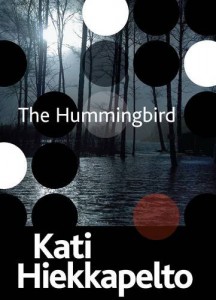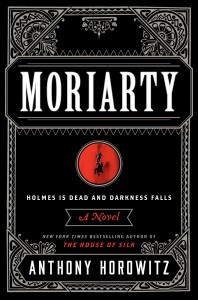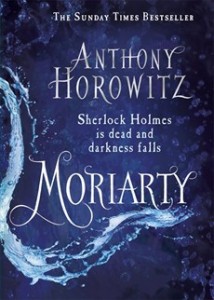 Foul Trade by B. K. Duncan published by Oak Tree Press
Foul Trade by B. K. Duncan published by Oak Tree Press
The Hummingbird by Kati Hiekkapelto published by Arcadia
Moriarty by Anthony Horowitz published by Orion UK, Harper US
Two interesting first novels have appeared this month, set almost a century apart. Both are about women fighting for acceptance in professional worlds ruled by people who believe their own natural qualities make them incontestably superior to anyone who differs from them.
B. K. Duncan’s Foul Trade is set in Poplar, in the East End of London, just after the First World War. Her main character, May Keaps, served as a nurse at the front and now works as the Coroner’s Officer. She would clearly be more than capable of doing the Coroner’s job, but her sex means she’s unlikely to progress beyond the role of Officer. There are few enough women doing even that subordinate job. Her work is mainly administrative, but it includes providing the Coroner’s jury with the evidence needed to produce a verdict. May takes her responsibilities more than seriously, going way beyond her remit in investigating the criminals who should be brought before the Coroner’s court. At the same time, she is doing her best to protect her younger – and flightier – sister Alice who longs to be an actress and has taken a job in the local theatre’s box office.
May is a terrific character, all too aware of pain and fear but refusing to let either deflect her from what she knows is right. She is realistic in her ambitions, except when she puts herself in physical danger in the hunt for vicious thugs. But her setting is absolutely convincing. Poor in comparison with the Coroner himself, she is still much better off than many of the people she deals with in Poplar, whose lives are dreadful.
B. K. Duncan’s research is impressive, and she writes well. Foul Trade may not have the pace of a flashy modern thriller, but it provides a chewy and satisfactory account of London nearly one hundred years ago, when those interested in justice were battling with so many of the same problems that exist today: the trade in dangerous drugs, the exploitation of vulnerable women, endemic poverty, lack of aspiration, and misogyny. I hope it is only the first of a series.
Set in the present day, Kati Hiekkapelto’s The Hummingbird sees Anna Fekete fighting for acceptance in the Crime Unit in an unnamed Finnish city. Anna’s gender is not the source of her difficulties at work; she faces contempt because she is an immigrant. Hungarian by descent, she was brought up in Serbia and is therefore an outsider among the Finns. Even her well-disposed boss points out her strangeness when he says, ‘It’s great to get an officer from an immigrant background on our team.’ One of the others, a prejudiced, drunken oaf called Esko, loathes foreigners. He’s sure that they all batten on the honest tax-paying citizens of northern Europe and he does everything he can to make Anna’s life a nightmare.
She has plenty of her own problems, and she is perceptive and honest enough to admit that her brother is just the sort of man to reinforce the prejudices of people like Esko. Unlike his sister, Ákos Fekete has not bothered to learn Finnish, or get a job. He lives on benefit, drinks himself into a stupor at every opportunity, and is interested in anyone he could persuade to hand over cash. Two main cases take up Anna’s working hours: a serial killer is stabbing runners to death on a favourite track through the forest; and Bihar, daughter of Kurdish immigrants, first makes a terrified call to the police and then denies she’s in any danger at all. Anna, knowing all too much about the difficulties Bihar must be facing, refuses to be put off and watches over her.
Hiekkapelto’s account of the experience of so many immigrants is both acute and very sad. She shows how parents risk everything to give their children a better chance than they’d get in their country of origin, only to find that they hate the society into which they have moved; miss their own customs and language; and resent the way their more  adaptable children become integrated into their new world. Although this aspect of the novel is the most interesting, there are plenty of twists in the investigations to keep the reader guessing.
adaptable children become integrated into their new world. Although this aspect of the novel is the most interesting, there are plenty of twists in the investigations to keep the reader guessing.
I must confess to a prejudice of my own: I dislike the whole business of modern writers ghosting novels for the famous dead. However, Anthony Horowitz’s Moriarty has seduced me with its wit and style. He writes extremely well, and in bringing Sir Arthur Conan Doyle’s Napoleon of Crime back into the public gaze, he provides great entertainment.
 After the disaster at the Reichenbach Falls, an American detective from the Pinkerton Agency joins forces with Inspector Athelney Jones of Scotland Yard to beat off a new master criminal, who sees that Moriarty’s death has left an enticing gap in the blackest of markets. Clever and funny, Moriarty beat off all my prejudices.
After the disaster at the Reichenbach Falls, an American detective from the Pinkerton Agency joins forces with Inspector Athelney Jones of Scotland Yard to beat off a new master criminal, who sees that Moriarty’s death has left an enticing gap in the blackest of markets. Clever and funny, Moriarty beat off all my prejudices.

I too loved Foul Trade. A gutsy heroine, lots of action and great detail about life in the 1920s. The subplot involving the theatre added a touch of glamour. Looking forward to reading Moriarty although I too share the reservations about a new author.